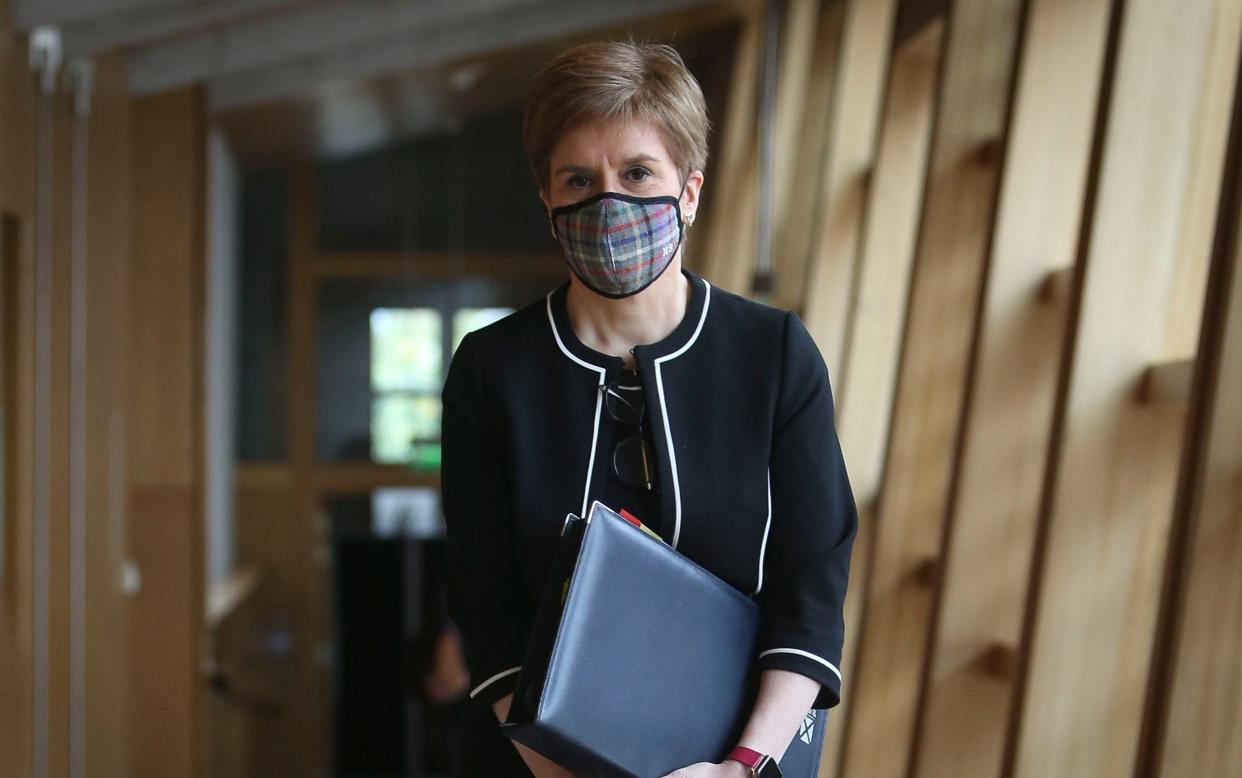Sturgeon shuts pubs and restaurants across central belt as she hands 'death sentence' to businesses

- Oops!Something went wrong.Please try again later.
All pubs, bars and restaurants serving more than half of Scotland's population are to shut for at least 16 days from this weekend, under complicated rules unveiled by Nicola Sturgeon to prevent Covid-19 surging back to its spring peak.
The First Minister announced that all licensed premises in the Central Belt, with the exception of hotels for residents and takeaways, will be required to close indoors and outdoors from 6pm on Friday.
They will remain shut for three weekends, until Sunday Oct 25, but Ms Sturgeon warned this end date will be kept "under review."
The tough measures will apply in five health board areas - Greater Glasgow & Clyde, Lanarkshire, Ayrshire & Arran, Lothian and Forth Valley - covering around 3.3 million people or 60 per cent of Scotland's population.
Cafes that do not have an alcohol license can stay open until 6pm but snooker and pool halls, indoor bowling alleys, casinos and bingo halls will also shut.
Ms Sturgeon also that contact sports, with the exception of professional sport events, outdoor live events and group exercise activities will be banned. Gyms will remain open for individual exercise.
Although mandatory travel restrictions were not imposed, she urged people living in the five regions to avoid "public transport unless it is absolutely necessary" and "not to travel outside the health board area they live in."
In the remainder of the country, licensed premises will be allowed to open for indoors service between 6am and 6pm but will be barred from selling alcoholic drinks.
They will be permitted to continue serving alcohol outdoors until the existing curfew time of 10pm, subject to the limit on gatherings of six people and two households.
Ms Sturgeon also requested that shops across Scotland return to two-metre physical distancing and one-way systems. The wearing of face coverings is to be extended to include workplace canteens and corridors.
The First Minister announced £40 million of support for affected businesses but the hospitality sector said she had "effectively signed a death sentence for many businesses" despite the "real problem" being socialising at home.
Stephen Montgomery, spokesman for the Scottish Hospitality Group, said: "This latest blow from the Scottish Government will create fear and anger across our industry. This is not a “short, sharp shock”, rather a crippling stranglehold that will result in many Scottish pubs and restaurants unable to reopen in lockdown areas if this becomes indefinite.
"We have repeatedly asked for scientific data from the Scottish Government to validate these escalating restrictions and yet we have been singled out, charged and found guilty without any supporting evidence."
Andrew McRae, the Federation of Small Businesses' Scotland policy chair, said: " “Without sufficient support from government, today’s moves could mean last orders for many independent pubs and restaurants. They’ll also cause a significant knock-on impact on our tourism sector, on our hospitality supply chain, and on those that operate in our night-time economy like taxi drivers and takeaways."
Scotland recorded 1,054 new coronavirus cases in 24 hours, according to figures published shortly before Ms Sturgeon's parliamentary statement.
The record high figure was published by the Scottish Government from Health Protection Scotland data.
One further death of a patient within 28 days of first testing positive for the virus was registered in the past 24 hours, taking this total to 2,533.
The new cases represent 13.0 per cent of newly-tested individuals, down from 13.2 per cent on Tuesday.
Of the new cases, 410 are in Greater Glasgow and Clyde, 195 in Lanarkshire and 190 in Lothian.
The measures announced on Wednesday were put in place to ensure there will not be a full lockdown in the future, Ms Sturgeon said.
She told MSPs: "These new restrictions will last for 16 days. They are intended to be short, sharp action to arrest a worrying increase in infection.
"However, although they are temporary, they are needed.
"Without them, there is a risk the virus will be out of control by the end of this month.
"But with them, we hope to slow its spread. That will help to keep schools and businesses open over the winter. And it will save lives."

